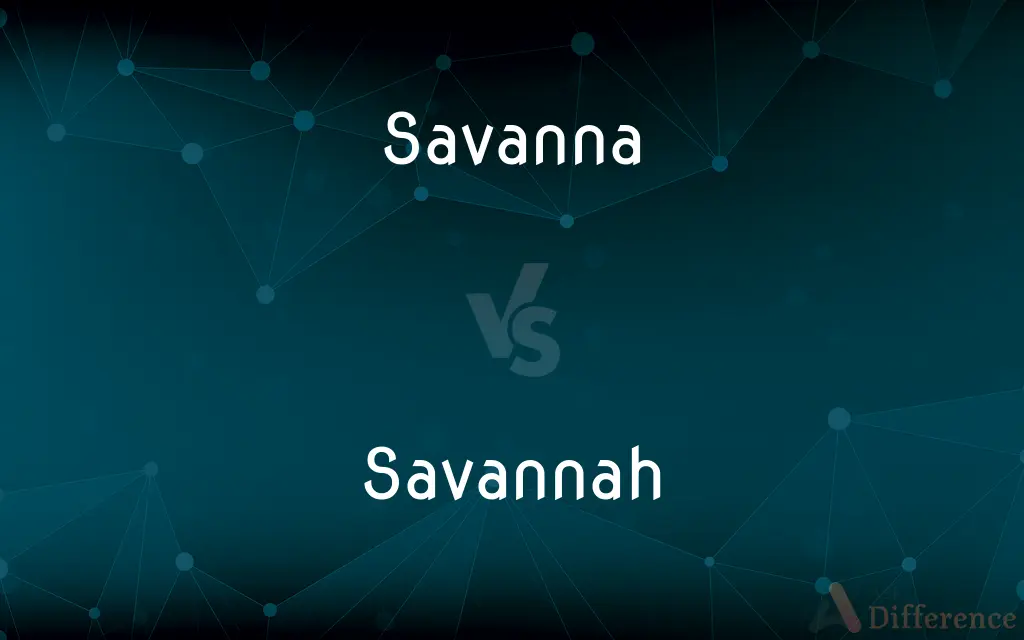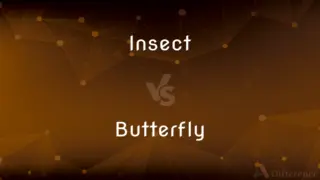Savanna vs. Savannah — What's the Difference?
By Fiza Rafique & Urooj Arif — Updated on March 17, 2024
"Savanna" refers to a grassland ecosystem with scattered trees, found in tropical and subtropical regions. "Savannah" is often used interchangeably with "savanna" but can also refer to a city in Georgia, USA.

Difference Between Savanna and Savannah
Table of Contents
ADVERTISEMENT
Key Differences
Savanna embodies a specific type of biome characterized by its mixture of grassland and sparse trees, which thrives under warm climates with seasonal rainfall. Savannas are crucial for studying ecological interactions, carbon storage, and the impacts of climate change. Savannah, while commonly used to describe the same biome as "savanna," brings an additional dimension as the name of a well-known city.
This ecosystem of savanna supports a diverse array of flora and fauna adapted to its unique conditions, promoting biodiversity through its distinct ecological balance. Savannah, Georgia, is celebrated for its historic architecture, vibrant culture, and significant role in American history. The dual use of "savannah" reflects the word's versatility in English, encompassing both natural and cultural geographical references.
The spelling distinction between "savanna" and "savannah" often comes down to regional preferences, with "savanna" more frequently used in scientific and ecological contexts. This preference helps maintain clarity when discussing the biome, especially in academic and environmental research. On the other hand, "savannah" as a place name is fixed, highlighting the historical and cultural identity of the city.
Both terms share an etymological root, derived from indigenous terms for "treeless plains" or "grassy plain," emphasizing their connection to landscapes defined by vast grasslands and occasional trees. This common origin underscores the linguistic adaptation of words to describe specific environmental features, which has evolved over time to include both natural and urban entities.
Despite their similarities, the context in which "savanna" and "savannah" are used greatly affects their interpretation. In discussions focused on ecology and environmental science, "savanna" is preferred to accurately describe the biome. Conversely, "savannah" is more likely to evoke images of the Georgian city, with its rich cultural heritage and historical significance, especially within the United States.
ADVERTISEMENT
Comparison Chart
Definition
A grassland ecosystem with scattered trees.
Interchangeably a grassland biome or a city in Georgia, USA.
Usage
Primarily in ecological and scientific contexts.
Both for the biome and culturally for the city.
Significance
Important for biodiversity and ecological studies.
Cultural, historical, and ecological significance.
Spelling
Preferred spelling in scientific contexts.
Often used in cultural or place-name contexts.
Context
Refers to a type of biome in tropical and subtropical regions.
Can refer to a specific location or the biome, depending on context.
Compare with Definitions
Savanna
Landscape Feature.
Savannas are characterized by their grassy expanses dotted with trees.
Savannah
Cultural Center.
The Savannah Music Festival attracts visitors from all over the world.
Savanna
Climatic Region.
Savanna regions experience seasonal rainfall and prolonged dry periods.
Savannah
Ecological Reference.
Discussions about the Savannah River often touch on conservation efforts for the surrounding savannah biome.
Savanna
Ecological Zone.
Research on the savanna focuses on its role in global carbon cycling.
Savannah
Historical Significance.
Savannah played a crucial role in both the American Revolution and Civil War.
Savanna
Biome.
The African savanna is home to a wide range of wildlife, including lions, elephants, and giraffes.
Savannah
Tourist Destination.
Tourists flock to Savannah to experience its ghost tours and southern charm.
Savanna
Biodiversity Hotspot.
The savanna's unique ecosystem supports diverse plant and animal species.
Savannah
City in Georgia.
Savannah is known for its historic squares, cobblestone streets, and antebellum architecture.
Savanna
A savanna or savannah is a mixed woodland-grassland ecosystem characterised by the trees being sufficiently widely spaced so that the canopy does not close. The open canopy allows sufficient light to reach the ground to support an unbroken herbaceous layer consisting primarily of grasses.Savannas maintain an open canopy despite a high tree density.
Savannah
A port in Georgia, just south of the border with South Carolina, on the Savannah River close to its outlet on the Atlantic; population 132,410 (est. 2008).
Savanna
A grassland with scattered tree growth, especially in a tropical or subtropical region.
Savannah
Alternative spelling of savanna
Savanna
A tropical grassland with scattered trees
Savannah
A port in eastern Georgia near the mouth of the Savannah river
Savanna
A tract of level land covered with the vegetable growth usually found in a damp soil and warm climate, - as grass or reeds, - but destitute of trees.
Savannahs are clear pieces of land without woods.
Savannah
A river in South Carolina that flows southeast to the Atlantic
Savanna
A flat grassland in tropical or subtropical regions
Savannah
A flat grassland in tropical or subtropical regions
Common Curiosities
What makes Savannah, Georgia, significant?
Savannah, Georgia, is significant for its historical architecture, role in American history, and cultural attractions, making it a popular tourist destination.
Are savannas only found in Africa?
While African savannas are the most well-known, savanna ecosystems are found across various continents, including Australia, South America, and India.
How do savanna and Savannah differ in spelling and usage?
"Savanna" is primarily used in scientific contexts to describe the biome, while "Savannah" is used both for the city in Georgia and occasionally for the biome, depending on the context.
What is Savannah?
Savannah can refer to the same grassland ecosystem or, more specifically, to the historic city in Georgia, USA, known for its rich cultural and historical heritage.
What is a savanna?
A savanna is a grassland ecosystem characterized by sparse trees, found mainly in tropical and subtropical regions, known for its biodiversity.
What are the key features of a savanna ecosystem?
Key features include a warm climate, seasonal rainfall, grasslands with scattered trees, and a diverse array of flora and fauna adapted to these conditions.
Why is Savannah, Georgia, often associated with historical significance?
Its well-preserved historic district, role in early American history, and architectural landmarks highlight Savannah's contribution to the cultural and historical fabric of the United States.
How is the city of Savannah, Georgia, distinct from a savanna biome?
Savannah, Georgia, is a historic city known for its architectural beauty, cultural heritage, and significant role in American history. In contrast, a savanna biome refers to a natural ecosystem with specific climatic and biological characteristics.
What defines a savanna ecosystem?
A savanna is characterized by its expansive grasslands with scattered trees, adapted to tropical and subtropical climates with seasonal rainfall. This ecosystem supports a rich biodiversity, including various plant and animal species.
Can the terms "savanna" and "Savannah" be used interchangeably?
While "savanna" and "Savannah" can both refer to the grassland ecosystem, the context matters. "Savanna" is preferred in scientific discussions about the biome, whereas "Savannah" typically refers to the city in Georgia, USA, though it may occasionally be used for the biome as well.
Why is Savannah, Georgia, considered a significant cultural and historical destination?
Savannah is celebrated for its well-preserved historic district, including cobblestone streets, antebellum architecture, and significant sites from the American Revolution and Civil War. Its cultural events, like the Savannah Music Festival, further enhance its appeal as a tourist destination.
Are savannas unique to Africa, or can they be found in other parts of the world?
While African savannas are among the most famous, savanna ecosystems are global and can be found in several continents, including South America, Australia, and Asia. These regions share the savanna's characteristic climate and ecological features but may host diverse species adapted to their specific environments.
Can "savanna" and "Savannah" be used interchangeably when referring to the biome?
Yes, but "savanna" is preferred in scientific contexts to avoid confusion with the city of Savannah, Georgia.
Share Your Discovery

Previous Comparison
Insect vs. Butterfly
Next Comparison
Baron vs. BarrenAuthor Spotlight
Written by
Fiza RafiqueFiza Rafique is a skilled content writer at AskDifference.com, where she meticulously refines and enhances written pieces. Drawing from her vast editorial expertise, Fiza ensures clarity, accuracy, and precision in every article. Passionate about language, she continually seeks to elevate the quality of content for readers worldwide.
Co-written by
Urooj ArifUrooj is a skilled content writer at Ask Difference, known for her exceptional ability to simplify complex topics into engaging and informative content. With a passion for research and a flair for clear, concise writing, she consistently delivers articles that resonate with our diverse audience.














































